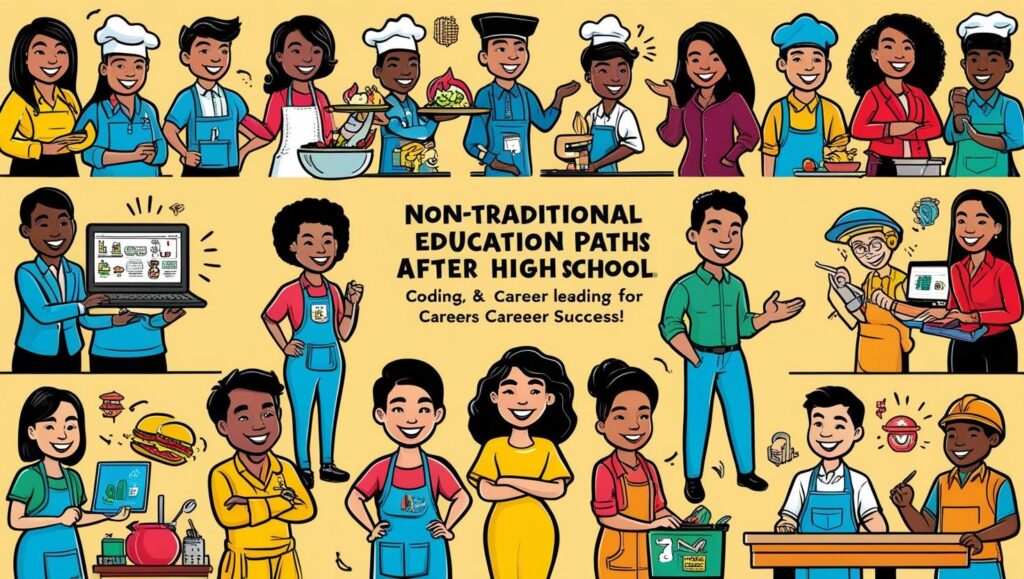Getting a job in the US is getting harder than ever because of the competition and qualifications, but the constant evolution of the professional world we see today. Effective career planning is instrumental in enabling you to achieve long-term success. In an era of automation, remote work, and changing needs of industries, professionals are now required to anticipate growth opportunities and connect them with contemporary demands of the job market. Mapping a transparent career path can be helpful for anyone who wants to build, advance, or start over in their career.
Deciphering the US Job Market Dynamics in US Career Planning
The US Job Market is a constantly evolving ecosystem, shaped by economic, technological, and global forces. Opportunities are many, but so are the competitors in every sector. We are getting into the details here of what personnel policy to look out for and how to remain competitive. With an increase in digital transformation, there is a greater need for IT professionals, data experts, and cybersecurity engineers, to give a few examples. Health care, renewable energy, and finance, meanwhile, are sectors with potential as well. Identifying these changes helps job seekers tailor their approach to industries either consistently or newly in demand.
Why Career Planning is Important For Long-Term Success.

Genuine career planning is finding your next job, but also ensuring that you have a sustainable future. It is the process of understanding your interests, abilities, values, and future aspirations. This will help you line up with occupations that pay handsomely, but further, give you individual fulfillment and d chance for development. Having a solid career plan provides you with a guide that makes it easier to make the right decisions, invest in relevant training and development, and navigate unforeseen changes. A plan makes you feel so much more equipped to navigate transitions, whether entering the workforce or switching gears into something new.
Recognizing Your Skills and Strengths
An important point of developing a career is understanding what skills are transferable. These are all soft skills, such as communication, critical thinking, problem-solving, and leadership, that are broadly applicable to many roles and industries. By knowing what your strengths are, it opens you up to many more paths in your career and helps you stay flexible with changing job availability. These skills, when used correctly in your resume or explained properly in interviews, reflect the versatility tied to your personality, which attracts employers beyond the title of job or the industry. Being agile in these skillsets through continuous learning makes sure you stay relevant in the ever-evolving job market.
Leveraging education and career growth opportunities

While formal education provides the foundation that is needed, your professional life will require you to keep your competitive edge. Pursuing relevant online courses, obtaining certifications, attending workshops, or even completing a degree program shows your dedication to your profession. Your traditional qualifications matter much less in the eyes of many hiring managers today, as focus is placed on current, job-related skills. Pursuing certifications that are recognized industry-wide or learning digital tools associated with your core competency can significantly enhance your employability. Now that educational platforms have become more accessible than ever, the only reason you can have for not upskilling is time, which you can easily manage if you make it a priority to get the skills expected of expectations for candidates today.
Build a Resume and Personal Branding
A resume is the first impression you give to the employer, and let us not ignore: A market that is already oversaturated needs to be the most prominent. Customizing your resume for each position, since most companies use ATS systems, and this system will look for keywords, past accomplishments, and any measurable outcome associated with an achievement. Along with having a great resume, personal branding is now essential. Use platforms such as LinkedIn, where you can display your expertise, opinion, and the ability to network with leaders in this field. It helps your credibility and provides you with opportunities that you never dreamed of, even when you aren’t looking for a job.
Navigating the Job Market as an Experienced Professional
Job searching in the US needs a strategic approach. The key thing to note here is that it doesn’t work most of the time if you are just applying to jobs out of a random whim. In contrast, strategies for a targeted job search, such as meeting people in the industry, collaborating with recruiters, or pursuing an online job fair, generally bring more rewards. Casting your net wide over different platforms like job boards, the employer site, and social media is also a good idea. Organization, follow-ups after applications or interviews, and scorekeeping keep you on point so you can improve your approach and keep your spirits (or spirits) high in the long game that is the job hunt.
Confidently prepare for Interviews.
Answering questions and getting interviewed are two different things; it is storytelling. Most importantly, you can ace a lot of interviews just by thoroughly preparing: learning as much as possible about the company/company culture, preparing for common questions, and preparing your success stories and examples to back you up. But employers are looking for candidates who not only match the job description but also match their values and their culture. This helps you better believe your answers. Furthermore, since virtual interviews have become the norm, familiarity with video tools and managing a professional presence on screen are now essential elements of effective interview preparation.
How to build and maintain a professional network

Networking is still one of the best levers for success, regardless of where you stand in your career. Building authentic connections with industry peers can offer you leads, mentorship, and references for jobs. Networking does not just happen at events; it is about being visible on LinkedIn, engaging in professional groups, webinars, or industry conferences. A good network will inform you about job openings, industry changes, and opportunities that are not formally advertised.
Synchronizing Career Aspirations with Industry Dynamics
For your career plan to be a successful one, it should never be in a static mode. Continuously assessing your objectives and recalibrating them according to current job market conditions helps you stay grounded in reality. The evolution of industries and the change of roles- often rapid. Searches, news, and industry reports enable you to pivot or invest in skills that will equip you to be a more attractive candidate. Such as AI and automation, that is transforming many legacy jobs into other forms, making digital literacy a must-have talent across industries. The ability to adapt your objectives means doing well despite change.
Keeping the Persistence and Passion While Traveling in Your Career
Career development is a long-distance race, not a short one. It will have peaks and valleys, defeats and victories. Career resilience is what makes you best able to ride these ups and downs with assuredness. This involves cultivating a growth mindset, asking for feedback, underpromising and overdelivering, and celebrating progress, even the smallest victories. The mentors you surround yourself with or the people you keep around to support you give you the motivation and the encouragement to keep going. In the big, competitive US market, mental durability and perseverance matter just as much — if not more — than competence and intelligence.
Conclusion
Charting your course in the US job market will require diligent career planning, flexible employment strategies, and knowledge of trends in the job market. You continue to evolve with time, and so should your career by enrolling in a niche and acquiring skills, polishing your soft/hard skills, and building your professional network. Human beings adapt, but only if you stay current, make investments in your skills, and are open to change, you will have a job. What you do today will determine your future — the decisions you make, the paths you choose.



